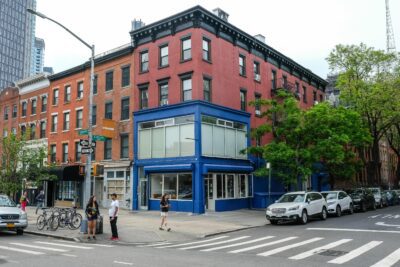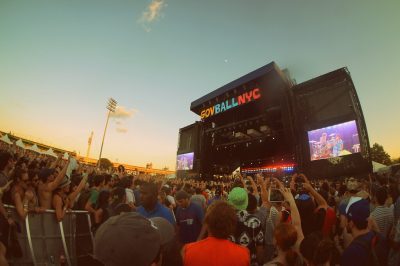A Food Conversation with the Founders of Bitten


We’re always eager to engage in spirited conversations about what’s new and what’s next in food; in fact, Northside’s annual festival, Taste Talks, was created in order to do just that. And we’re equally excited about anyone who’s goal is to bring culinary issues and innovations to the fore, which is why we were pleased to chat with Naz Riahi and Emily Schildt of Bitten—who’s inaugural conference this February brought together thought leaders such as ICE’s Dorothy Cann Hamilton, The Future Market’s Mike Lee, and Gabi Lewis and Greg Sewitz of Exo, in order to expound on the evolution of the chef, what supermarkets will look like in the year 2065, and why insects are the next big thing in protein.
What were your professional backgrounds, prior to founding Bitten?
Naz Riahi: I started out working in advertising; in an innovations group for an agency. When I left them, I reached out to Emily to see if we could partner up on something together, which is how the idea for Bitten came about (which, in addition to the conference, is also a culture and creative marketing agency).
Emily Schildt: I used to work for a fast-growing food start-up, left in late 2013, and started consulting in marketing, social media and digital strategy. So when Naz and I met, it was a good opportunity, since I had a flexible schedule, to work on Bitten, which was a passion project at the time. After our first event, and all the positive momentum from that, we’re excited to watch it evolve!
How did the two of you initially meet?
NR: We met through Instagram actually. I came across Emily’s page and really liked her feed. I thought she seemed like an interesting person, and somewhere down the line, the kind of person I would want to work with. So a year ago this month, we met in person at Smile café, got along really well and bonded over our love for Everlane and the fact that we wear the same clothes all the time. Even at the conference, we showed up wearing exactly the same thing without having planned it.
ES: Unplanned nerd-dom. So yeah, the first time we met, Naz said to me that she had a feeling we’d wind up working together. I was a little creeped out… (laughing)
NR: You were creeped out? I was being creepy, oh my god… (laughing)
So how did you come up with the idea for Bitten?
NR: Emily had a food background and I had worked with some food clients through my agency, so we figured food would be an interesting space for both of us. We feel like there’s so much innovation happening in food today, that’s going to affect all of us in the future. But we also felt that all of the events and conferences that were happening around food seemed very serious, and had this air of only being open to people that worked within food. So we decided that yes, while food is serious, and it’s right to be worried about how we’re going to continue to feed a growing population, and take care of our environment while we do it, food is also really, really fun. It doesn’t have to be this dire thing that we have to be depressed about and have all of these concerns about. So we decided to position food as a pillar of pop culture, and thought by saying that, we were opening the space up to people that weren’t necessarily in the food industry, but were still interested in innovation and pop culture and trends.
ES: in my former life, I went to so many food events and a lot of them were either straight boring or trade shows. I’d never been to an event that focused on the disruptive elements of food, with TED Talks style speakers. So it was kind of exciting to do an event like they do in the tech world so commonly, but with food.
Much like our own food festival, Taste Talks, your conference honored culinary influencers, and examined how eating turned from something that we all just did a few times a day to survive, into a global phenomenon deeply embedded in pop culture. What to you think precipitated this ravenous, worldwide interest in all things culinary?
NR: Certainly the digital age and access to the internet has helped trends become more widespread much faster than they ever have before. The age of Instagram, where anyone, whether they work in the restaurant industry or not, can take a picture of their meal has certainly helped push food forward.
ES: This generation grew up on sushi and things that are more elevated at the foundation than what our parents ate. Chefs and tastemakers of all kinds are challenged with being innovative and creative just to be interesting. There’s more pressure than ever before.
Did you have an idea of particular topics you wanted to pursue during your initial conference, and then pursued guests that could speak to that topic, or vice versa?
ES: We definitely had an idea of the key stories that we wanted to tell, and within those topic areas, who we thought could speak to them the best. But that being said, our speakers were so amazing that there was no need for hand holding or guiding; they were just incredible at putting together their presentations.
NR: We’re not authorities or positioning ourselves as such. And we’re not going to tell Dorothy Hamilton what to speak about.
So what were some of the larger stories you were trying to tell?
NR: We had the founders of Exo as speakers, which was interesting on so many levels. They make protein bars out of cricket flour, which focuses on environmental responsibility, and being able to provide protein to a growing population in a sustainable fashion. A bunch of experts talking about bugs as the future of protein is totally relevant. But it’s also a pop culture story. They were funded on Kickstarter. They’re a really cool young brand.
ES: Also, we wanted to cover a broad range to diversify the conversation. We knew we wanted to have a chef, we knew we wanted to have startup brands, we knew that we wanted to have a food stylist and a food media representative.
So what’s next for Bitten?
ES: We sure hope that this can become our full time thing. Naz and I are so incredibly humbled by the positive feedback we received for our first big event. Especially since we never really envisioned ourselves as event planners. But everyone said that it went really smoothly, and that they left feeling really inspired, which is such an incredible thing for us. And so, we’re really looking to expand and extend Bitten into smaller, more intimate curated events throughout the year, and then also consult through our marketing arm.
NR: Emily and I told each other that we were going to take the weekend off after Bitten, because we were so exhausted. And literally, we both woke up the next morning and started shooting emails back and forth about the future of Bitten and the second iteration of Bitten. Obviously we’re going to have another annual conference. But we got a lot of feedback from people wishing they could have had more opportunity to interact with the speakers. Which is not always feasible when you have 280 people in attendance. So the goal is to have a number of intimate conversations throughout the year with thought leaders as well. And as part of the creative consultancy side of Bitten, a lot of food people are approaching us to potentially work on their brands. Which is really exciting because as we said, there’s so much innovation happening in the food space, that there’s so much room for that creativity to extend beyond just the brand, but in advertising, and the way the business is run.
You might also like 




















